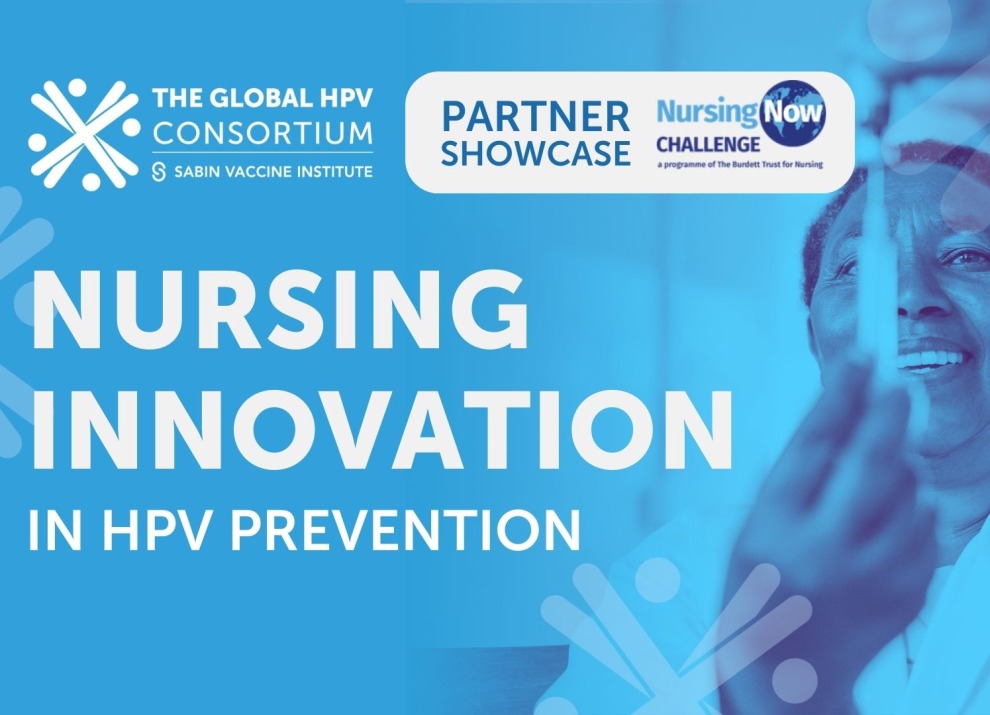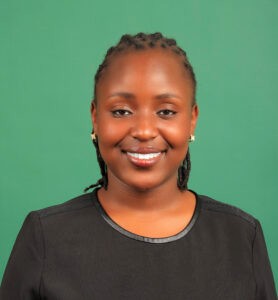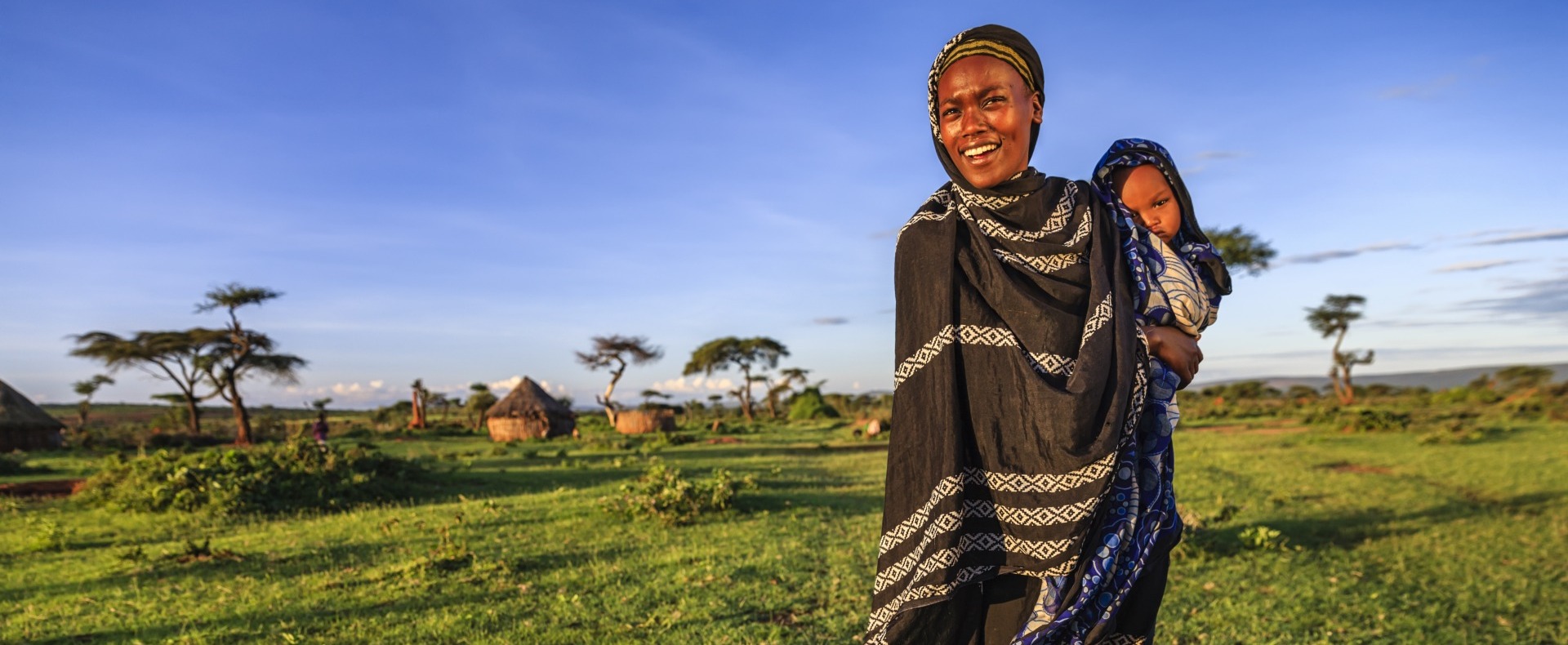Three Student Nurses Win Innovation Challenge for HPV Prevention

A rotation through a mother and child hospital. A relative’s cervical cancer discovered through routine screening. An encounter with a young 21-year-old cervical cancer patient.
These experiences sparked the interest of three student nurses from Africa who won the 2025 Nursing Now Challenge Global Solutions Initiative — launched in collaboration with the Global HPV Consortium housed at the Sabin Vaccine Institute. Each awardee had their unique motivation to improve access, acceptance, and uptake of HPV and cervical cancer preventive services, but all share one common thread: a creative approach that involves nurses leading solutions to prevent HPV, which is responsible for 95% of all cervical cancers.
Get to know awardees Constance Naliaka, Benedicta Oluwafisayomi Ogunyinka, and Mitchel Akinyi Awiti below, then watch them present their winning concepts on Sabin’s YouTube channel.
Benedicta Oluwafisayomi Ogunyinka

For Benedicta Ogunyinka, nursing was a natural career choice – following in the footsteps of two aunts as she grew up in her town of Abeokuta, Ogun State, Nigeria. “They advised me to go to a university program,” she says. “It felt right.”
Benedicta has now finished her fifth year in a nursing program at the University of Ibadan in Oyo State – the oldest degree-awarding university in Nigeria. It was here that she served as the Deputy Speaker of the Faculty Student Representative Council and led the Academic and Mentorship Committee of the Nigerian Universities Nursing Students Association, University of Ibadan Chapter, driving academic support and mentorship initiatives. She discovered her interest in female reproductive health research after encountering a 21-year-old woman with cervical cancer. She conducted a mini-research project on HPV vaccination initiation and realized there was significant opportunity in working with primary, secondary, and tertiary school health programs. ”Nigeria implemented a routine HPV vaccine program in 2023, but there were lots of barriers. I found females don’t know much about the preventive measures they can take to protect their health.”
When she heard about the Nursing Now Challenge initiative to develop a project for HPV prevention, Benedicta submitted a concept note for a tracking program that would help identify where and how many young women were getting vaccinated. It would involve digital communication, as that is what young women read and share, and would also include explanations of the need for vaccination to parents and community leaders. “This inclusive approach is important, as we need to educate the public.”
Nurses, she says, “are in the best position to convince the community, as they are the ones people go to with their problems and they reside in the community. It makes them more credible, and with the help of technology, we would be able to identify the areas where more nursing involvement is needed.”
Benedicta is currently awaiting the commencement of her internship program and hopes to continue her work in reproductive health. As a registered nurse and certified family planner, she actively participates in community health outreaches. Nurses are versatile, she says. “You can blend research, advocacy and innovation to address public health challenges.”
Constance Naliaka

Constance Naliaka was nearing the end of her four-year nursing program at Kisii University in Kenya when she began a rotation in a mother and child hospital at Shianda Health Center. She also volunteers with the Reproductive and Sexual Health Program for Kenyan Teenagers (RESPEKT), where she has come to develop interest in Reproductive Health. She heard about the Global Solutions Initiative in HPV prevention with the Global HPV Consortium and “I said, ‘Wow, this is perfect, because I’m doing women’s health right now.’“
During the rotation, Constance worked in HPV vaccination clinics and cervical cancer screenings. “People were not coming in at all,” she notes. “I feel like we need to make this a much bigger deal. There just isn’t enough known about it. There’s need for proactive invitation of women to come for screening.”
For her winning project, Constance developed an HPV Day program for primary schools. “In Kenya, the HPV vaccination is given to 10-year-old girls. If female parents come with their children on HPV Days to give consent, they can also be educated about cervical cancer and even set up for cervical cancer screening.” Seeing their daughters get protected and “maybe some group dynamics will encourage the women to get screened,” she says. “It’s not just about the nurse and the students, and it’s easier than going to the hospital alone.”
Constance will begin a government-required internship after graduation, and hopes to continue her work educating about HPV and cervical cancer, even if it means volunteering. “I didn’t know what HPV was until I learned in class,” she says. “My sister was asking me about it just after I won the challenge. It needs to be a much bigger deal.”
Mitchel Akinyi Awiti

As a young girl in Nakuru, Kenya, Mitchel Akinyi Awiti would ask her siblings to pretend to be her patient. “I knew I wanted to help people and work in health even then,” she says. “It was something innate in me.”
Then an aunt was diagnosed with cervical cancer during a routine screening. “If my aunt had delayed her screening, if it had not been detected, she would not have survived,” she says. “It made me realize how many people are missing out on prevention and early screening.”
Now a third-year nursing student at Chuka University in Kenya, Mitchel is pursuing her life-long dream to work in health care, aiming for a career as a Community Health nurse and researcher. Among her many activities — she serves as the Secretary General of both Chuka University Nursing Students Association, where she leads in health education initiatives, and the Special Projects Committee of the Kenya Student and Novice Nurses Chapter, contributing to student empowerment — she is researching innovative ways to educate about HPV, HPV vaccination, and cervical cancer screening. “My school is located in a somewhat remote area, so many people don’t have access to information,” she says. “Less than 40% of this population is aware of cervical cancer, and most are unaware that the HPV vaccine prevents it.”
She had a project in mind when she heard about the Nursing Now Challenge Global Solutions Initiative and call for ideas to improve access and acceptance of the HPV vaccine: using native language storytelling to educate about HPV. She also hopes to develop a program on her college’s radio station, produced by nursing students, to create local language storytelling that would teach about cervical cancer and HPV vaccination. “So many people here believe things they’ve heard from people who are not health care providers,” she says. “Using skits and plays, illustrations and digital media in local language makes it easier to relate to these stories and to develop trust and credibility.”
Mitchel plans to weave HPV advocacy into her career whenever she can. “I want to see people doing well and take charge of their health. If we can increase information-sharing, vaccine and screening uptake, I will be making a difference.”
Recommended for you

We make vaccines more accessible, enable innovation and expand immunization across the globe.





